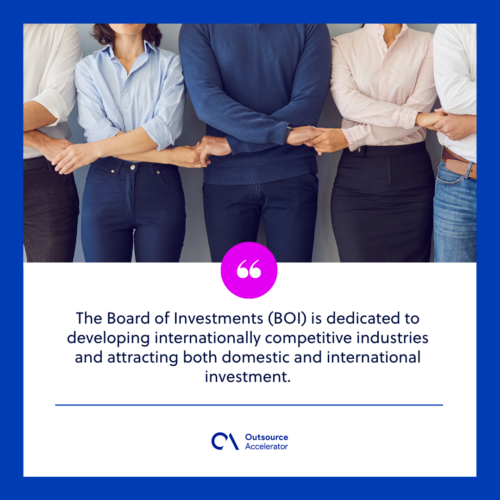Board of Investments (BOI)
Definition
What is the Board of Investments (BOI)?
The Board of Investments (BOI) is a public sector investment promotion organization that offers tax incentives to both domestic and international companies operating in the Philippines. BOI is handled by the Department of Trade and Industry (DTI).
Its function is to help the Philippine government promote inbound investments and economic growth. BOI does this by recruiting investors and entrepreneurs to venture capital and company establishment in the Philippines.

Responsibilities of Board of Investments (BOI)
Assist entrepreneurs
One of the responsibilities of BOI is to help, assist, or guide entrepreneurs when it comes to business processes and requirements.
The agency also offers aftercare to ensure that business owners remain informed about their advantages as they pertain to their field of business.
Ensure the flow of investments in the country
In addition, the Board of Investments (BOI) can coordinate programs to enhance investor-friendly and effective collaboration. BOI provides accurate and reliable information regarding the investing climate in the Philippines.
Further, it provides the path for greater exposure to your business and more possibilities to interact with other businesses through local and international missions. It helps increase your investment and production capabilities towards your business.
Tax holidays, tax and duty exemptions on imported capital equipment, and all the additional advantages of doing business in the Philippines are available to business owners.
Provide relevant information
The Board of Investments (BOI) provides all the resources and incentives you’ll need to help investors reach their full potential.
BOI provides information and briefing sessions to keep you up to information on these policies and to remind you of them.
It might also serve as a channel for your feedback and responses. The Board of Investments (BOI) is pleased to listen to your concerns and make investment-friendly recommendations.
Mission and vision of the Board of Investments
By 2022, the Board of Investments aims to establish a worldwide Industry Promotion Agency (IPA) dedicated to accelerating investments, industry growth, and long-term employment generation.
The Board of Investments (BOI) is dedicated to developing internationally competitive industries and attracting both domestic and international investment.
As a result, growing employment through the appropriate use of the country’s resources, governed by private initiative and government collaboration principles.
To fulfill these obligations, the Board of Investments (BOI) guarantees to provide competent and efficient service while maintaining the highest standards of ethics and professionalism.
The Board of Investments (BOI) will provide productive and knowledgeable service while maintaining the highest standards of integrity and professionalism to fulfill these obligations.
Complying with all applicable legal, statutory, and regulatory requirements, and motivated by a desire to improve customer satisfaction.

The Philippines as the most promising destination for foreign investment
According to the United Nations Conference on Trade and Development (UNCTAD), the Philippines has ranked as one of the world’s most attractive destinations for foreign investment in the next three years.
The Philippines ranked 8th out of the top 15 destinations, six steps up from the previous survey’s 14th place.
Strong domestic demand, a recovery in exports, and the completion of planned infrastructure projects have all contributed to this growth, which has generated new company activity, created more employment, increased household spending, and reduced poverty.
The Philippines has had a steady trend of economic and financial gains, backed by good governance and sound economic reforms.
Also, giving people sufficient opportunity to overcome challenges such as weather-related disasters, global economic slowdown, and domestic uncertainties, particularly those related to the change in administration.
The internal economy of the country is considerably more resilient, and there is still a possibility for development.







 Independent
Independent




